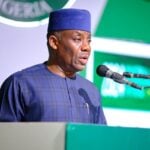Chairman of the Federal Civil Service Commission (FCSC), Professor Tunji Olaopa, has urged that only great managers should be made vice chancellors and members of governing councils of universities.
Olaopa made the call on Monday while delivering the second distinguished personality lecture of the Emmanuel Alayande University of Education, Oyo, to mark the second anniversary of the tenure of the vice chancellor, Professor Olanrewaju Olaniyan.
The former Federal Permanent Secretary who spoke on the theme, ‘Reforming the Reform of the Education Sector in Nigeria’ noted the challenges of transitioning from a college of education to a university, with the need to bring many professors on board, stating that it is in the midst of such challenges that vice chancellors and governing council members thrive.
He lauded Professor Olaniyan’s leadership, saying: “if all the associated issues have been managed seamlessly without culture shocks for any of the parties, then kudos to Professor Olaniyan and the entire management team.”
Olaopa who referred to what he termed the “Next Level for University Governance and Management’ gave an illustration of how great managers shape universities.
According to Olaopa, “today, there is a growing trend in high-performing and world-class ranking of universities, where proven managers are appointed as university presidents or vice chancellor rather than academics.
He said that this trend which had gained traction globally today had started playing out even in Nigeria as back as 1967 during the golden era of the public service and the university system.
“The expanding global shift to diversify the sourcing of university administrators beyond the university system and beyond the fold of academics, is driven by increasing complexity of higher education management, and the need for strong leadership for frontier shifting in areas such as fundraising, strategic planning, expanding institutional partnerships, deepening of public private partnership and university-industry partnership for more sustainable funding to enable significant administrative and financial autonomy, and overall, institutional development especially in the craving for quality, relevance, internationalisation and global ranking.
Unarguably, public universities in Nigeria face growing financial challenges, requiring CEOs with strong fundraising, financial management skills, leadership to help to navigate a competitive global landscape and long-term planning that require strong strategic thinking and problem-solving skills honed in proven capacity to manage complex projects, building relationships with donors, alumni, industry, development and government agencies, securing resources and supports.
“It also requires expertise and leadership in building systems, operational efficiency, resource allocation and utilisation, process improvement, adapting new technologies, pedagogical approaches, and responding to societal demands, without losing academic focus, neglecting of core academic mission and values, and hindering academic freedom and research-rooted creativity”, he said.
According to him, while these skills and competences can be found in academics as the likes of Prof Dato Dr Mazliham Mohd Su’ud and the president/CEO of the Multimedia University (MMU), Prof. Sir Ian Greer, president/VC Queen’s University, Belfast, Prof. Wim de Villiers, VC/Rector at Stellenbosch University, the point being made is that the need to bridge the gap between academic and managerial expertise is becoming critical if there must be growth and transition from the virtual generalists and activism-rooted inertia and the recycling of managerial ignorance that has stagnated higher education administration and progress in Nigeria.
ALSO READ FROM NIGERIAN TRIBUNE: Airport incident: FG names KWAM 1 airport security protocol ambassador
“This of course extends to policy making and the Leading of Change in the Education Sector at the Level of Policy Innovation and National Change Management: Getting the Basics Right.
“This argument also tells us that Nigeria does not lack a rich repertoire of expert-driven knowledge and policy initiatives on how the education system can be reformed.
However, to get the basic rights in reforming the education system, one does not need more and more schematics and modelling and analytics which Nigeria is not lacking. What is needed to connect education design and implementation is a singularly pragmatic and strategic out-of-the-box problem solving managerial acumen”, Olaopa added.
WATCH TOP VIDEOS FROM NIGERIAN TRIBUNE TV
- Let’s Talk About SELF-AWARENESS
- Is Your Confidence Mistaken for Pride? Let’s talk about it
- Is Etiquette About Perfection…Or Just Not Being Rude?
- Top Psychologist Reveal 3 Signs You’re Struggling With Imposter Syndrome
- Do You Pick Up Work-Related Calls at Midnight or Never? Let’s Talk About Boundaries






